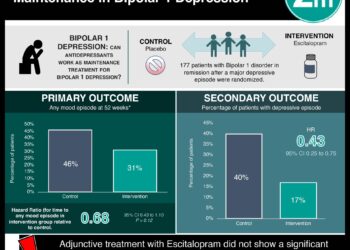Sublingual dexmedetomidine reduces agitation in patients with acute agitation associated with bipolar disorder
1. Among patients with mild to moderate agitation associated with bipolar disorder, treatment with sublingual dexmedetomidine resulted in significantly greater reduction in the agitation score compared to placebo.
2. Further research is required to understand the spectrum of patients with bipolar disorder and agitation for whom this investigational treatment would be effective and feasible.
Evidence Rating Level: 1 (Excellent)
Study Rundown: The management of acute agitation in patients with bipolar disorder requires a patient-centred approach where the goal pharmacological treatment should be to induce calm without oversedation. Dexmedetomidine is an α2-adrenergic receptor agonist approved for procedural sedation and anesthesia. This study assessed the efficacy of a single dose of sublingual dexmedetomidine in reducing symptoms of acute agitation associated with bipolar disorder. The main endpoint was the mean change from baseline at 2 hours for the Positive and Negative Syndrome Scale-Excited Component (PEC) total score (5 – absence of agitation to 35 – extremely severe). The secondary endpoint was the earliest time to a statistically significant delta in PEC score from baseline for the intervention groups vs placebo. Among 380 patients with mild to moderate agitation associated with bipolar disorder, treatment with sublingual dexmedetomidine 180 μg or 120 μg resulted in a statistically significant greater reduction in the agitation score at 2 hours compared to placebo. Further research is required to understand the spectrum of patients with bipolar disorder and agitation for whom this investigational treatment would be effective and feasible. A limitation of this study was that it only evaluated efficacy and adverse effects of sublingual dexmedetomidine following a single episode of mild to moderate agitation, reducing the generalizability of the study’s findings in clinical context.
Click to read the study in JAMA
Click to read an accompanying editorial in JAMA
Relevant Reading: Safety and efficacy of dexmedetomidine as a sedative agent for performing awake intubation: a meta-analysis
In-Depth [randomized clinical trial]: This randomized, double-blind, placebo-controlled trial enrolled 380 patients (mean age, 45.6 years; 54.8% women; 56.1% Black individuals) across 15 US centers between February and April 2020. Participants were randomized to sublingual dexmedetomidine 180 μg (n = 127), sublingual dexmedetomidine 120 μg (n = 127), or placebo (n = 126). The mean PEC total score at baseline was 18.0. At 2 hours after taking the medication, the mean change from baseline in PEC total score were −10.4 for sublingual dexmedetomidine 180 μg, −9.0 for sublingual dexmedetomidine 120 μg, and −4.9 for placebo. Treatment effects were observed 20 minutes after oral administration of sublingual dexmedetomidine (least-square mean difference for 180 μg, −1.1 [97.5%CI, −2.0 to −0.2]; P = .007; for 120 μg, −1.0 [97.5%CI, −1.9 to −0.1]; P = .009). Adverse events were observed in 35.7% of patients taking 180 μg of dexmedetomidine, 34.9% taking 120 μg, and 17.5% taking placebo, where the most common adverse effect was somnolence (21.4% vs 20.6% vs 4.8%).
Image: PD
©2022 2 Minute Medicine, Inc. All rights reserved. No works may be reproduced without expressed written consent from 2 Minute Medicine, Inc. Inquire about licensing here. No article should be construed as medical advice and is not intended as such by the authors or by 2 Minute Medicine, Inc.







